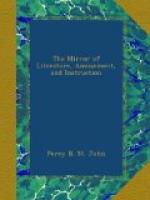The conversation of Mr. Shelley, from the extent of his poetic reading and the strange, mystic speculations into which his system of philosophy led him, was of a nature strongly to arrest and interest the attention of Lord Byron, and to turn him away from worldly associations and topics into more abstract and untrodden ways of thought. As far as contrast, indeed, is an enlivening ingredient of such intercourse, it would be difficult to find two persons more formed to whet each other’s faculties by discussion, as on few points of common interest between them did their opinions agree; and that this difference had its root deep in the conformation of their respective minds needs but a glance through the rich, glittering labyrinth of Mr. Shelley’s pages to assure us.
Letter of Lord to Lady Byron.
“I have to acknowledge the receipt of ‘Ada’s hair,’ which is very soft and pretty, and nearly as dark already as mine was at twelve years old, if I may judge from what I recollect of some in Augusta’s possession, taken at that age. But it don’t curl—perhaps from its being let grow. I also thank you for the inscription of the date and name, and I will tell you why;—I believe that they are the only two or three words of your hand-writing in my possession. For your letters I returned, and except the two words, or rather the one word, ‘household,’ written twice in an old account book, I have no other. I burnt your last note, for two reasons:—firstly, it was written in a style not very agreeable; and, secondly, I wish to take your word without documents, which are the worldly resources of suspicious people. I suppose that this note will reach you somewhere about Ada’s birthday—the 10th of December, I believe. She will then be six; so that in about twelve more I shall have some chance of meeting her; perhaps sooner, if I am obliged to go to England by business or otherwise. Recollect, however, one thing, either in distance or nearness;—every day which keeps us asunder should, after so long a period, rather soften our mutual feelings, which must always have one rallying-point as long as our child exists, which I presume we both hope will be long after either of her parents. The time which has elapsed since the separation has been considerably more than the whole brief period of our union, and the not much longer one of our prior acquaintance. We both made a bitter mistake; but now it is over, and irrevocably so. For, at thirty-three on my part, and a few years less on yours, though it is no very extended period of life, still it is one when the habits and thought are generally so formed as to admit of no modification; and as we could not agree when younger, we should with difficulty do so now. I say all this, because I own to you, that, notwithstanding everything, I considered our re-union as not impossible for more than a year after the separation; but then I gave up the hope entirely and for ever. But this very impossibility of reunion seems to me at




